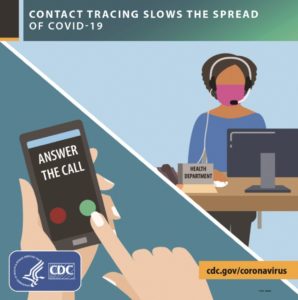PROVINCETOWN — Massachusetts is ramping up efforts to find positive cases of coronavirus. Asymptomatic screening programs are being expanded around the state, and Provincetown recently announced it will begin a wastewater screening program as well.
The point of finding those who test positive, however, is to follow their close contacts, find more cases, and get all of the relevant people to quarantine at home, so they can clear their infections without the virus spreading to others. Instead of shutting down the whole state, the plan is to shut down chains of transmission between individuals — a strategy that has proved to work in many countries.
This entire model works only if people cooperate with contact tracers, however. And when the stakes seem high, and cooperation means identifying the closest people in your life to a public health nurse, there’s a temptation to stay quiet.
“We’re getting a lot of pushback,” said Meg Payne, operations manager of the largest contact tracing effort on Cape Cod. “People are hesitant to give out names. We get hung up on a lot.”
Payne works for the Visiting Nurses Association of Cape Cod, which manages contact tracing for 12 of the 15 Cape towns — all except Provincetown, Sandwich, and Barnstable. The VNA also does contact tracing for five towns in Plymouth County: Kingston, Carver, Plimpton, Halifax, and Marshfield.
“Even with the ‘Answer the Call’ campaigns, people are still really skeptical,” Payne said. “There are some that are grateful, and happy that we’re reaching out. I’d say the majority are skeptical, particularly when it comes to their contacts. People get a little protective.”

The reasons aren’t hard to understand. Identified people whom the public health nurses decide are “close contacts” have to self-quarantine for 14 days. A negative test result, even from a polymerise chain reaction (PCR) laboratory test, isn’t enough to end that 14-day quarantine. That’s in accord with current CDC guidelines, and it’s been state policy since July 3, said Dr. Robert Duncanson, Chatham’s director of health and environment.
A July 12 party in Chatham resulted in a cluster of at least 13 Covid cases, the Cape Cod Chronicle reported last week. Between 30 and 50 people attended the party, according to the report.
“If the VNA calls someone up, and that person says they have no close contacts, because they don’t want to impact their family or friends, then none of us will have that information,” said Duncanson. “You can’t force them to do it. You’re really dependent on the honesty of the people you’re talking to. That’s the difficulty with contact tracing anywhere.”
“Some of these people ought to be telling us about more people than they’re telling us about,” said Payne. “The ratio of active cases to identified contacts pretty clearly suggests that not everyone is cooperating with this program,” she added.
Active cases, probable cases, and identified contacts are all logged into a statewide infectious disease tracking database called MAVEN, said Payne. To help describe how contact tracing is going, Payne did two similar searches in MAVEN, covering the dates July 1 through Aug. 3, and covering all 17 towns where the VNA-Cape Cod is contact tracing. There were 156 active and probable cases in those 17 towns in that time period, said Payne. There were 212 identified contacts in those towns.
Some identified contacts may have gone on to be coded as active cases. Even so, “That’s not a lot of contacts” compared to the number of active cases, said Payne.
Supportive Care
Payne, Duncanson, and Provincetown Health Director Morgan Clark all said that resources exist to help people through their quarantines. Help with groceries, pet care, and other needs is available. Provincetown has contracted with the AIDS Support Group of Cape Cod to help provide comprehensive care to people with coronavirus, and to people who are contacts and under quarantine, said Clark.
Interestingly, the demand for help has been low.
“We always ask, but the common answer is, ‘I have friends who can bring me food,’ ” said Payne.
“We haven’t gotten any requests to assist,” said Duncanson.
“We’re trying to make sure people know they have access to support,” said Clark.
Public health nurse Deirdre Arvidson works for Barnstable County and is managing Provincetown’s contact tracing effort. “The standard we use for ‘close contact’ is 10 minutes or more of exposure, within six feet, without PPE,” said Arvidson.
“Most of the people I’ve talked to, by the time we reach them, they’ve already talked to their employer,” she said. “They’re usually already aware” before she calls.
“If I feel like they haven’t already told their employer, and I get the sense there’s a chance they might not, then I will call the employer myself,” added Arvidson. “I won’t use the person’s name. I’ll just say, ‘You have an employee who needs to quarantine.’ But 99 percent of people have already talked to their employer before I ever reach them.”
This points to another aspect of contact tracing: many people are reaching out to their close contacts directly, and only then telling the contact tracer about them.
It’s somewhat comforting to think that people who hang up on a contact tracer may still be notifying their social circle directly. But that can lead to its own temptations — like using a rapid test to “clear” yourself, when those tests have a high false negative rate. People may also be tempted to go back to work after getting a negative PCR test — even though public health authorities very clearly insist that known exposures must quarantine for a full two weeks to be sure they’re not contagious.
“I really just want to emphasize — no one is getting in trouble here,” said Payne. “There’s no public health police. We’re just trying to prevent the spread. We don’t care about anything else.”
